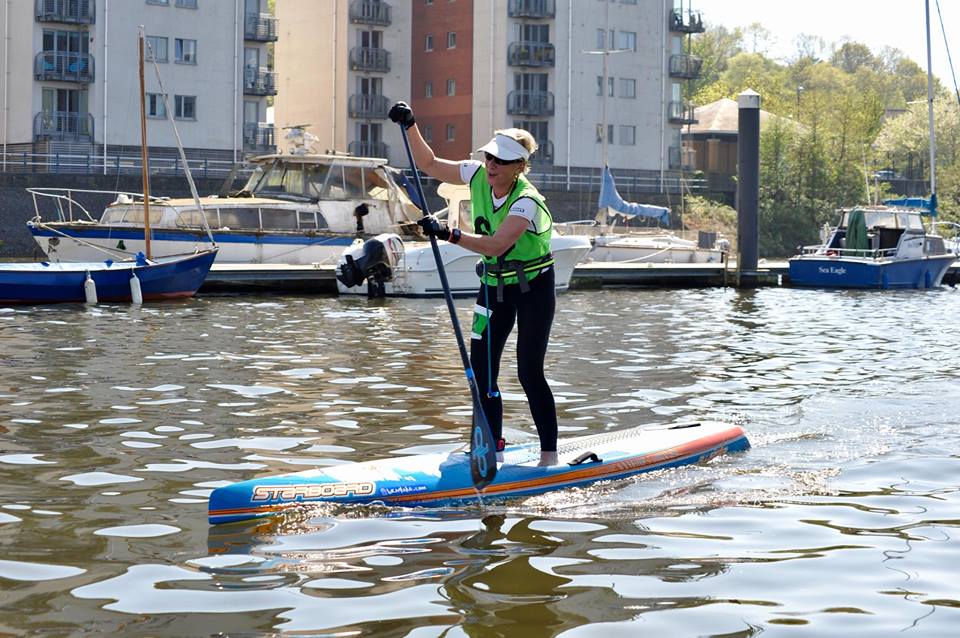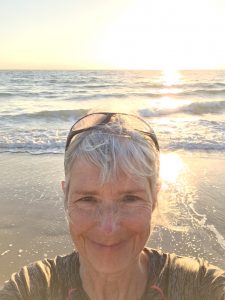My second guest blogger is also one of my role models!
I got to know Susan Jones first as a formidable stand-up paddleboarder: she’s focused, disciplined, and as a competitor highly accomplished. As a club mate — she also trains at Bray Lake — Susan is wise, supportive, and a lot of fun.
But of course — as is generally the case with remarkable women — there’s so much more to Susan’s story than I could have ever imagined….
 Guest blogger Susan Jones
Guest blogger Susan Jones
Tell me a little about yourself — where you’re from, where you live now, your family…
I was born in 1951, in Salford, and I now live in Beaconsfield, Buckinghamshire, with my second husband, Rod.
My late mother was a clever woman, but bitter because she had to give up work when she married. As a young woman, she’d been very slim but put on weight when she had me and my two brothers. I hated her being so big and when my first husband said: ‘Don’t ever get fat like your mother’, I swore to myself that I never would. An anti-role model, if ever there was one!
She outlived my father by some years — he died very suddenly from a heart attack, aged 69. I respected and loved him very much, for his character and expertise as an engineer.
I was educated at Manchester High School for Girls and then read French at St Anne’s College, Oxford. I speak fluent French — mostly the result of spending three months immersed at a Paris lycee when I was 16! — and I taught it for seven years before taking a career break to have my children.
My son contracted pneumonia immediately after he was born in 1980. I didn’t hold him until he was six days old, and at one point he was only given a 50-50 chance of surviving. But thankfully he did and is now a strapping 38-year-old builder and a dad himself! My daughter arrived two years later, and she recently became a mum.
Once they were both at school, I held a series of sales and marketing positions with the Cambridge University Press and then — later on — worked with Rod in his business until he was bought out and I left to look after my elderly mother.
I’ve had my fair share of personal trauma over the years including several sudden and unexpected family bereavements. No need for all the grim details, but the year before my son was born I miscarried twins at 20 weeks. One survived for a few hours, so we were able to have a funeral, and I feel very fortunate that I was able to grieve more fully than many who experience perinatal death.
You refer to your ‘first husband’ — can you share what happened there?
When the children were 13 and 11, I found out that my husband was having an affair. This couple’s children were the same ages as ours, and we spent a lot of time together — biking, sailing, skiing, partying… I therefore knew the ‘other woman’ very well, and knew that she and my husband really did get on. So I decided to offer to leave the family home on condition that she and her children move in and our children suffered no disruption.
I’d seen too many embittered women whose husbands had left them with the children, and I was determined that wouldn’t happen to us. So we all agreed to remain amicable and we put everything in place within a few weeks. I have had to deal with guilt around my decision, but I still feel it was the right one.
Wow! All of that would have broken some women. How have you got through it?
Yes, a lot of bereavement, a lot of pain — physical and psychological — much anger, sadness and guilt. All of which can either take you down or make you stronger. I’ve learned the importance of grief, the acceptance of guilt, the power of forgiveness, and the effectiveness of positive decisions.
I’ve learned to focus on the good experiences and to never look back in anger.
One of my key tenets now is ‘family first’, and family is taking up more and more of my time — time I give gladly and unconditionally. That feeling that I should be doing something else just melts away when it comes to my family. Someone once said to me: ‘You love your children, but you fall in love with your grandchildren’, and I couldn’t agree more.
Before we look at you and sport, do you have any other interests?
I’m secretary of the Beaconsfield Community Association, membership secretary of the Beaconsfield Twinning Association, and I organise and lead ‘Brush Up Your French’ sessions which I host at home.
I keep my French up to date, and I’m trying to improve my Spanish, and my Italian, though that’s on the back burner until I have more time. As is German.
And so to sport — SUP apart, what’s your story here?
I played netball at school, but I neglected exercise while at Oxford in favour of my social life (oh, and doing the work needed to get a degree!).
Sailing and skiing were both a big part of my first married life. We started skiing in 1976, loved it and and went as often as we could. I occasionally skied with Rod after we got together, but he was never keen and I’d pretty much given up hope of ever skiing again until my daughter invited me to her hen do in Morzine. By then, I’d had my left hip replaced due to osteo-arthritis and I had to ask myself if I could do this, aged 64.
One session on a dry slope showed I hadn’t lost it, and I had a marvellous week in France, even — dare I say it? — out-skiing some of the younger members of the party!
I began sailing dinghies in the late 1970s before moving up to larger yachts. But all that ended with my first marriage and I’ve not sailed since. However, I am now a member of the Upper Thames Sailing Club — so I have a river base on for my SUP! — and I’m not ruling out crewing for someone again one day.
Rod and I met in 1996 when I was 45, and I took up golf as he was a keen player. I had lessons and won some competitions. I got down to a 24 handicap but eventually my hip stopped me playing. However, like sailing, I may come back to golf in later life!
I did yoga for several years, and still incorporate yoga poses into my home exercises, and I’m a great fan of Nordic walking. Rod and I also took tai chi and qigong lessons.
That’s quite a track record! So how did you get into SUP?
It began after I bought a beach hut at Hayling Island in Hampshire in 2010. I saw someone out on the water on a paddleboard and was intrigued. But it wasn’t until two years later that I had my first lesson at Hayling, aged 61.
Then I discovered Bray Lake was just a half hour from home and by the end of August 2012, I’d bought my first inflatable board. My first race was in October that year — I came last and was completely hooked!
My first race outside Bray was the British SUP Club Championships at Eton Dorney in August 2013 — only six kilometres and a few turns, but a huge milestone for me.
Then everything went on hold while I had my hip replaced in November 2013. My goal was to be fully fit for the start of the 2014 season — I did absolutely everything I was told and started training as soon as I was allowed.

Susan showing me how it’s done during the 2018 National GB SUP Series 12’6″ finale at Sandbanks where she was first over-60 woman. I meanwhile spectacularly failed to finish… Photo: Sarah Thornely
My 63rd birthday present to myself was a brand new 12’ 6” 2014 Starboard All Star carbon board and I’ve been racing on it ever since. In that year’s UK race series, I was first woman in the 52+ age category in my class; this year I came first again in my age group and fourth woman in the 12′ 6″ board category.
As a break from paddleboarding, Bray team mate Lisa Walden and I hatched a plan to complete the 1.4 mile Pier to Pier charity swim in Bournemouth in summer 2015. I’d always supported my daughter in her triathlons, and had wondered whether I could do a distance swim myself. Here was my chance.

Susan with Bray Lake team mate Lisa Walden after completing the 2015 Bournemouth Pier to Pier charity swim.
So I began open water swimming aged 64 and on the day, we smashed it in a favourable wind and tide. Though I don’t do it often, it’s great knowing I can swim a distance in open water.
I’d no idea you were an open water swimmer as well! OK, so what has been your biggest SUP challenge so far?
That came in June 2017, when I was 66: the Norfolk Broads Ultra, 80 kilometres over two days. I trained hard physically and mentally because after the first day, you have to get up and do it all over again! It was the hottest day of the summer, 30C-plus, but I survived and completed the course. I had planned everything — clothes, nutrition, and hydration — very carefully, and it all worked.
That race ranks as one of my greatest achievements.
With SUP, my main aspiration is to maintain the fitness and strength needed to keep on paddling competitively. Once I can’t really do that meaningfully any more, I will move to the ‘leisure’ fleet, and after that just paddle when and where I can. This is the beauty of SUP — it can be enjoyed on so many levels.
I am, as you know, in awe of your achievements on your Starboard! Is there anything else that you believe contributes to your success?
Understanding one’s body and what happens to it as we age is key. Many people who get aches and pains just take tablets and stop doing things but that’s not my way. For me, it’s really important to get expert advice, make a plan, and execute it — just like in business!
That said, I know I’m fortunate to be able to afford private health insurance and take full advantage of the many complementary therapies not available on the NHS. For example, I do now experience pain in my right hip and had begun to think it might also need replacing. However, I found the Health Lodge in Hillingdon and they’ve identified key things I can work on. I’m doing very specific exercises to re-balance my left glute and hip flexor.
One thing I’ve always had, for over 30 years, is a personal trainer — from long before it was fashionable! I believe this is the best way to make sure you train correctly and are pushed to achieve your best.
Is there anything you do now you’re well into your 60s just to make you feel good?
I mentioned my ‘anti-role model’ mother, and I do believe there’s really no excuse now not to understand weight and the role of nutrition — indeed, it should be our prime concern, for health, fitness and disease prevention.
But for all we can keep our bodies in shape as we age, faces are another matter! And it’s true that plumper women often have fewer lines and wrinkles. So I recently had dermal filler injections. The result? Nobody noticed — or if they did, they didn’t say! But that’s not the point. I feel happy, because I feel I do look different, and therefore for me it was money well spent. Money I may well spend again…
I’ve also used DNAFit to find the best nutrition and and training for my own genetic profile. This has helped me look differently at both, and my view is that if it’s out there, use the technology!
And finally any advice for women as they move from their 50s into their 60s and beyond?
I welcomed being 50 as my 40s — as you’ve read — were very mixed. I never thought much about being 60, but now I’m staring 70 in the face, my philosophy is still the same: think about your age as a positive, not a negative.
Live each day as well as you can and only look back to see how far you’ve come.
Main image: Susan near the finish of the 2018 GB National SUP Series race in Cardiff, where she came in first over-60 in the 12’6″ race class. Photo: Sarah Thornely




Really lovely articles Eugenie – thank you for asking those questions of Susan and for Susan answering them so openly and honestly! You are both a credit to yourselves and the sport of SUP!!
Thanks, Sarah — much appreciated 🙂
Wow what a lady!! Congratulations on a fabulous interview Eugenie. I have to say a lot of what Susan went through with her marriage break down, the decision made with the children & determination to stay amicable especially for the children’s sake, mirrored my life in my late 30’s/40s, which is why I was quite tearful reading. But then Susan leaves me standing with her amazing fitness achievements. This gives me inspiration. Fabulous!!
Thanks, Sam 🙂